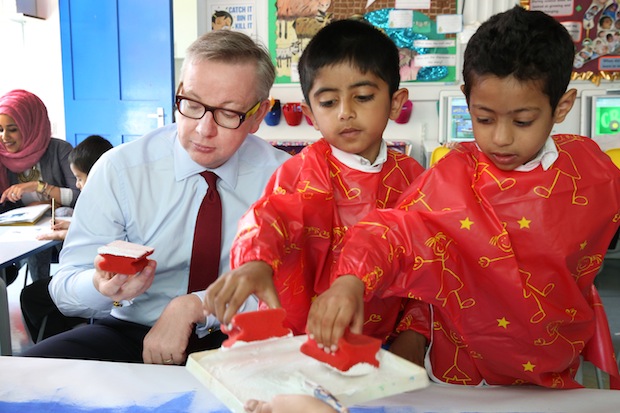My secondary education was unusual. I attended a comprehensive school until I was sixteen, and then a grammar school for sixth form. The comprehensive was superior because, through the diversity of its pupils and the inventiveness and experience of its staff, it taught me to think critically. My grammar was just a crammer for exams. I found it narrowing. I wrote as much in the Guardian recently. My article received plenty of criticism, as you’d expect from such a divisive policy issue — nothing, it seems, fires people up like education. Among the reaction was this full-blown response from Toby Young in a recent issue of the Spectator.
Young accused me — but really he was accusing my generation of state educated pupils — of being an ‘automaton’ who is ‘programmed to vote Labour’ because I accept ‘the prevailing orthodoxies of the Blob (Michael Gove’s word for the education establishment)… without a murmur of dissent.’ He went on to say that this is a result of my left-wing teachers being ‘highly selective about what they’ve encouraged [me] to think critically about’. As a result, I and hundreds of thousands like me simply regurgitate ‘left wing dogma’.
These claims are straight out of Michael Gove’s School of ‘Blame the Marxist teachers for anything and everything’ (earlier this year Michael Gove slammed his critics as ‘Marxist teachers hell bent on destroying our schools’, branding them the ‘Enemies of Promise’). Young’s critique is utterly bizarre. Of course, the scepticism of student bodies across the country has nothing to do with the fact that a right wing government took away their weekly Educational Maintenance Allowance. Likewise, it has nothing to do with the trebling of university fees. And it has nothing to do with cuts and austerity that are tearing communities apart. Don’t be silly! Those pesky Marxist teachers with their selective teaching methods are to blame!
What Gove and Young seem to overlook is that political opinions are formed outside the classroom, more so, certainly, than they are formed within. After all, how much politics can actually take place in a classroom, compared say to the bus, the street, the shop or the home? Given Gove and Young’s shared interest in ‘broadening’ education, I find their oversight in this respect a bit odd.
If ever we were programmed by the educational establishment to do anything, it would be to be sceptical of all political parties; indeed, it was Labour that introduced university top-up fees. Many students are suspicious of the entire political establishment, irrespective of which party is in power. There is a feeling of ‘them vs us’, and comfortable right wing commentators, with access to far greater platforms than a first year undergraduate at the LSE could hope for, belong firmly in the ‘them’ category.






Comments